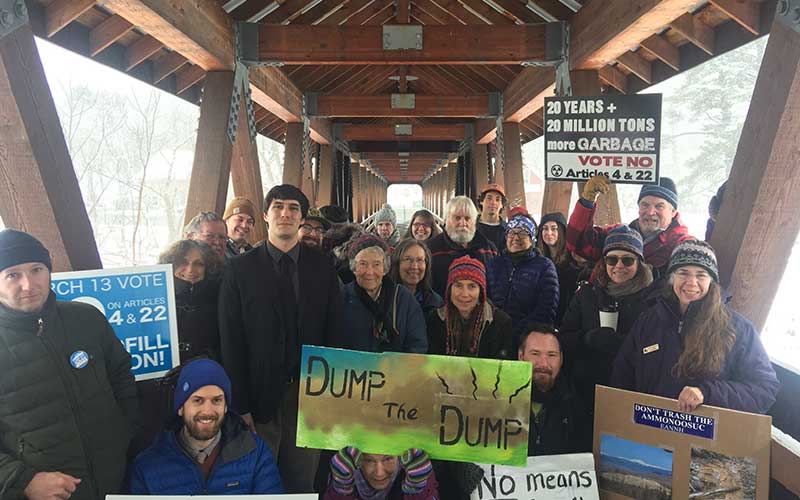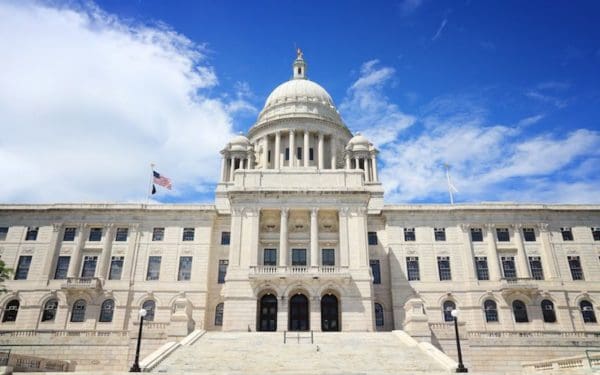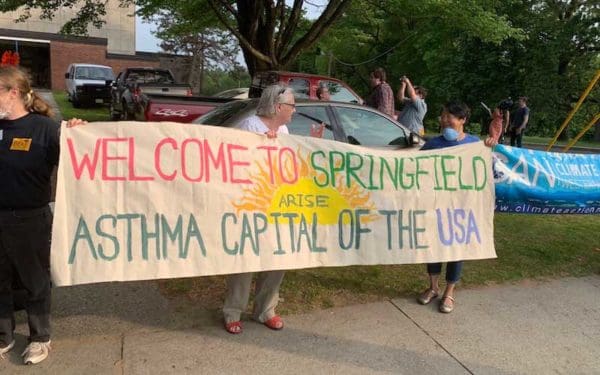
2018 Press Conference announcing an effort to stop the Bethlehem landfill expansion in New Hampshire. Photo: CLF
We all know the trash we throw away is a disaster for our environment and communities. From landfills growing into mountains of waste to incinerators spewing toxic pollutants to the pollution of our water and air (including climate-damaging emissions) – the impacts of waste disposal are not only disturbing, but they’re also avoidable.
For decades we’ve known that the best way to deal with waste is to reduce it and to rely on disposal only as a last resort. In fact, in the 1990s, New Hampshire’s legislature established a hierarchy of solid waste management methods that favor waste reduction over disposal, ranking landfilling dead last. It also set a goal of diverting at least 40% of the state’s waste away from disposal through source reduction, recycling, and composting.
More than 20 years later, however, New Hampshire has yet to move away from an approach that relies primarily on disposal – and we’ve yet to come close to achieving that 40% waste diversion goal. Making matters worse, the Granite State has become a dumping ground for the region, with roughly half of its waste coming from out-of-state sources.
It’s time, at long last, for New Hampshire to tackle this problem and abandon a failed model that relies primarily on disposal. That’s why CLF has been working hard to change the status quo – by advocating against continued landfill expansions and advocating for needed legislative action.
Putting the Brakes on Expanding Landfills
Perpetuating New Hampshire’s disposal-dominated model, in 2018, Waste Management, Inc., applied to the Department of Environmental Services (DES) to expand its Turnkey Landfill in Rochester, New Hampshire – already the largest landfill in New England. Waste Management’s goal? To expand the facility by an additional 59 acres to allow the disposal of 15.9 million tons of waste through 2034. Much, if not most, of that new waste would come from out of state.
In our effort to end the cycle of landfill expansion, CLF appealed Waste Management’s permit approval by DES. Our appeal called out DES’s failure to follow statewide solid waste planning and reporting requirements, causing the state agency to re-launch these much-needed efforts.
Our appeal also challenged an important condition in the permit – one intended to reduce waste flowing to the landfill, but which is so ambiguous that its actual effect in reducing waste is impossible to know. On the pivotal question of whether DES could premise its permit on such a vague condition, the state’s Waste Management Council voted 3 to 3. We’ve now taken the issue to the New Hampshire Supreme Court, where our appeal is currently pending.
Like Waste Management, Inc., another major industry player – Casella Waste Systems – recently sought permission to expand its landfill in Bethlehem, New Hampshire. Alongside several other advocates from the North Country, CLF opposed the expansion on the basis that prolonging the facility’s life would undermine the state’s waste diversion goal and continue its primary reliance on landfilling. Fortunately, DES agreed, recently issuing a decision finding that Casella’s expansion would be inconsistent with key waste policies.
Casella, of course, has no plans to give up. In both Bethlehem and neighboring Dalton, where it seeks to construct a new facility, the company appears committed to perpetuating its massive landfill operations, which include significant imports of out-of-state waste. Its operations have also polluted the Ammonoosuc River, which is the subject of a lawsuit by CLF and Toxics Action Center.
Legislative Action to Change the Model and Reduce Waste
Late last year, a legislative committee published a report identifying key shortcomings and essential needs for addressing New Hampshire’s waste problem. The report has since served as the state’s springboard for doubling down on critical legislative efforts. CLF has been actively involved in several of those endeavors – testifying before legislative committees or taking part in drafting bills. Here is what is currently under consideration by the Legislature:
From Waste Diversion to Waste Reduction
A new bill (SB 591) aims to bring waste reduction to the forefront where it belongs. It would replace the state’s current 40% waste diversion goal with a waste disposal reduction goal of 25% by 2030 and 45% by 2050.
CLF supports the overall concept of this bill but is advocating for more ambitious goals, including 80% waste disposal reduction by 2050. We’re also urging the waste reduction goal to clearly apply to trash imported from out of state, as it’s counterproductive for New Hampshire to cut its own waste disposal only to have private landfills import more and more waste from elsewhere.
Generating Needed Resources
Another bill CLF strongly supports (SB 629) would place an additional charge (or tipping fee) on all waste disposed of in New Hampshire. The additional fee would generate much-needed funds to support DES and local communities as they develop and implement waste reduction strategies, such as improved recycling programs and composting. We believe that, if amended to include a slightly higher surcharge, the legislation would also create important economic incentives to encourage waste reduction over waste disposal.
Hitting the Pause Button on Landfill Expansions
CLF strongly advocated in support of a bill (HB 1422) that would place a two-year moratorium on the expansion of waste disposal capacity. The legislation would go a long way in aligning actual practices with the state’s longstanding waste management hierarchy, which favors waste reduction over waste disposal. At a recent committee hearing on the bill, the public urged a needed pause in expanding disposal capacity to allow for the advancement of needed waste reduction planning.
In addition to these critical bills, essential legislation tackling single-use-plastics continues to move forward. Bills banning the use of polystyrene foam (HB 1564) and restricting the distribution of plastic straws (HB 1472) recently passed out of committee with favorable recommendations and are now headed to the House floor.
Progress on the Horizon?
The waste crisis is now receiving the attention it deserves, both here at home and regionwide. That makes us hopeful that New Hampshire can finally fulfill its goals of cutting waste and ending its reliance on disposal versus reduction. But it won’t be easy. Key industry players like Waste Management, Inc. – companies that profit off the waste they bury – are fighting for the status quo. Already, for example, it appears their efforts to prevent the moratorium on the expansion of landfill capacity have paid off.
We encourage you to stand with us by contacting your legislators and urging them to support these important bills. For additional information on how you can get involved in advocating for improved waste-management infrastructure in New Hampshire, please reach out.
Together, we can prevent New Hampshire from becoming New England’s dumping ground and create a new model for how to handle our waste.



